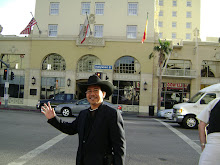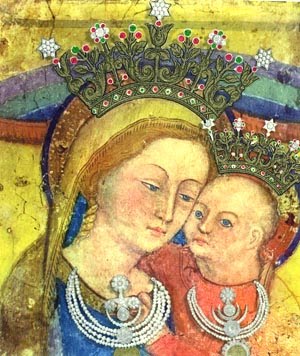Coming out from the men's comfort room after watching the movie Padre de Familya, I overheard one father blurt audibly "Walang moral lesson yun a!" Really? I thought the film was simply showing us the truth of Philippine society today. If that father in the comfort room was right, feelings of disappointment were definitely disturbing.
Sunday night, May 3, I went to SM San Lazaro to catch the last full showing of the movie Padre de Familya after missing it on its opening day last April 29. Thankful for seeing it advertised in the papers as showing in SM theatres, I immediately drove to the mall, and caught it right on time when the film title was on screen.
It shows the typical Filipino family: at table and praying Grace Before Meals. The father notes that the youngest daughter was holding the fork while not concentrating on the prayer. The usual sermon at table by the father: is that what we your parents have been teaching you all these years? Don't be like the rest of your friends who have forgotten God.
The father works as an inspector general at the municipal hall in the town of San Felipe. Regular and caring a father, he sends his two children, the older one a son, and the youngest, a daughter to the tricycle terminal on their way to school. The son asks his father to buy him a computer. He is graduating from college, and while he goes to his friends to do his computer lessons and assignments, he feels distracted and is afraid he may not pass some of his subjects. The father assures him that in time it should come. He then reaches the flag ceremony (Monday morning) of the municipal hall employees as the lady mayor blurts her heart out in typical uneducated English (for comic satiric effect!) about accusations of her corrupt activities related to the garbage dump. The office scene shows one lady employee selling half a pack of Philip Morris to another fellow employee who promises to pay when the salary comes. Soon lunch time comes, and a messenger from a company that has been closed due to its failure to keep the sanitation standards comes and attempts to bribe the sanitation officer. The scene ends with him telling his briber - while fellow employees watch: "Hindi ako tumatanggap ng suhol." This scene elicited in me a gasp of hope: thank God we have such an employee who is strong enough to say No to bribery.
His older daughter stays home with the mother caring for a young child (which towards the end of the film is identified as this daughter's daughter, product of teenage pregnancy) and doing the house chores under the watchful supervision of the mother. Then they all go shopping, with the supermarket scene ending with the mother snatching a box of cereals, placing it in the midst of her legs covered by the long skirt she was wearing. What they wanted to buy had amounted beyond the available money, hence giving the impression that indeed, the poor who can't afford are forced to do some "diskarte" if only to make ends meet.
Then comes the couple scene: the wife is complaining that her husband's sister in-law came during the day and asking for help for her husband who's on dialysis. (This makes me say to myself: kung sino pa ang walang pera, siya pa ang may maraming sakit na mahal gamutin!) While he gives his wife part of his salary, he hides under the image of Santo Ninio some amount (which will be shown in a later scene as reserved fund for his brother's dialysis fees.)
Then comes the scene where the only son is in the classroom taking a computerized exams. After the teacher leaves the room, one student takes the opportunity to cheat: asking everyone around for the answer. The son in this film gives out NO answer, and soon the next scene shows his classmate making him trip as he walks from the exams room with a classmate. This son is trying to be a man of principle, but his environment is filled with people who don't have principles, friends who have irrational views of life (including believing in chain text messages), maintaining self-defeating attitudes toward life's challenges (like: the mayor is a difficult enemy to fight, that the mayor earns more by kick-back despite the fact that she's filthy rich!, and that the higher the ladder goes, the higher the jueteng pay). He could only say against his friends: "The government may be filled with cheats and plunderers, but my father is NOT like them!"
The family is religious, with everyone hearing Mass together and spending time in the park. While the couple talks about their economic difficulties, the children are playing around. In the previous scene, the son gets mad at his father's wrong priority (giving money for his brother's dialysis treatment while having none for his new computer), and the father slapping his son, admittedly out of parental imposition of power on the son. The father knows his mistake, but he too is caught being the only one who seems capable of helping out with his brother's dialysis treatment. Then the rain comes, they huddle around a very tiny umbrella, laughing and frolicking as they get wet. This seems to be the film's way of saying that in the Filipino setting, conflicts are tided over when troubles come and challenge the family.
To make up for his son's need for a new computer, the father canvasses with a computer store for the specified unit, but it costs more than he can afford. Resolved that he will succumb to the bribery offer, he calls the computer store and have the unit delivered, cash on delivery basis. He then arranges for a meeting with the briber, but eventually gets caught in Imbestigador style: restaurant scene where the bribery takes place, marked money, policemen, and televised! Shame on the whole family descends, giving the son pressure in the school, making the man's family deliberate on whom to seek help from: former general-friends, this or that padrino, the saints, the Blessed Virgin Mary. As he leaves his office, he carries along a folder filled with evidence of the mayor's underhanded corrupt activities. None of his co-employees even says goodbye to him. He loses the chance to get his benefits as his case drags in the court.
The son then makes his move: to find a way to expose the big fish, only to end up being caught having the mobile unit of the mayor's aide. With two friends, he planned to snatch the mayor's aide's mobile phone where evidence of anomalous transactions were supposedly aplenty.
His father confronts his son, and ends up showing him the evidence. The son contacts the media, but the father doesn't show up. He chooses to go to his lady mayor-employer whose father is in-charge of underground activities. This powerful padrino promises to let the case just rot in the court files while he The distraught son and the lady interviewer end up waiting in vain for the father's cold feet.
The film ends with the son graduating, and everyone in the family dressed to the ninths, sign of the father's new connections and unspeakable doubtful employment that gives the family the edge to make ends meet unabatedly. They still pray their Grace Before Meals, but in a new house. The last scene is poignant: the son's eyes caught in the picture-taking scene.
Thoughts:
It's a heavy film showing something about corruption in our midst. We know it is happening, but all we do is talk about it. Like the son, some of us may really find ways to overthrow it, but we end up victims of our own carelessness.
I just hope as Counselors we do none of these things. Would that those who have been doing monkey business be given their days in jail. Would that when we have the evidence, we bring it out into the open even if it would mean we will have to be scrutinized ourselves. But like the father in the film: are we that ready to sacrifice the greater needs of those who depend on us when we will have to end up like Jun Lozada - in jail?
Is there a way out of this web of corruption? The film tries to offer some solutions: gradual improvement; catching the one who does the wrong. But this begs the question: why can't the big fish be caught?
The family remains to be what we have as a Filipino. It is a living proof that God loves us. But are we willing to continue feeding our families with money earned the wrong way? If we do so, then we reap the whirlwind: a cycle of corruption that we are too scared to confront because we might ourselves be tainted. HAAH!!!
Search This Blog
Tuesday, May 05, 2009
Subscribe to:
Post Comments (Atom)



No comments:
Post a Comment